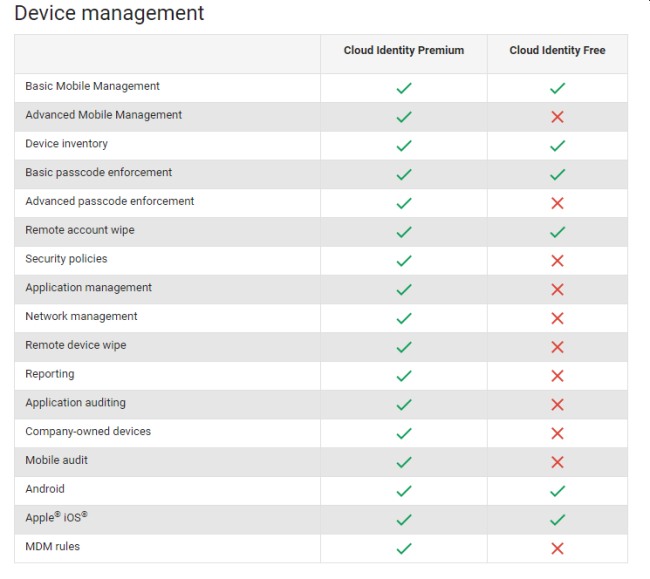Google is clearly targeting enterprise customers with its recent focus on security. Cloud Identity is an Identity as a Service (IDaaS) and enterprise mobility management (EMM) product.
This is basically the identity services and endpoint administration that are available in G Suite as a stand-alone product.
There is a free edition that includes core identity and endpoint management services. It provides managed Google Accounts to users who don’t need G Suite Services, such as Gmail or Google Drive. You can use Cloud Identity accounts with other Google services, such as Google Cloud Platform (GCP), Chrome, Android enterprise and a variety of third-party applications.
The Premium edition offers enterprise security, application management and device management, including automated user provisioning, app whitelisting and automated mobile device management.
 Some key differentiators between the standard and premium versions of Google’s Cloud Identity service are the device management options. The Premium version offers the kind of features – security policy enforcement, remote device wiping, network management and auditing – that corporates with large inventories require.
Some key differentiators between the standard and premium versions of Google’s Cloud Identity service are the device management options. The Premium version offers the kind of features – security policy enforcement, remote device wiping, network management and auditing – that corporates with large inventories require.
It’s no coincidence that Google’s Cloud Platform is offering the same kind of enterprise security features that have traditionally been associated with Microsoft’s Azure AD offerings.
While cloud computing facilitates collaboration across teams which may comprise employees in different locations, third-party suppliers and independent contractors, it’s vital for many organisations to have the kind of granular security controls over access and data that may be required by regulators, legislation or simple commercial imperatives.
Google has always done well in the tech industry and its price point and ease of use have attracted lots of startups and many SMEs. However, highly regulated industries like the finance sector and large corporates already invested heavily in competitor products have been reluctant to switch.
By demonstrating that Google’s Cloud Platform and G Suite packages can match the competition in terms of security it will be hoping to catch some bigger fish and make a dent in the lucrative world of the large enterprise.
There are however a couple of concerns for Google G Suite and Google Cloud users.
One is that by adding complexity to its products and the administration of them it may sacrifice some ease of use for users and up the requirements for in-house expertise. A big selling point for Cloud services is reduced management costs, but if the administration of cloud products and services becomes more and more complex, companies will have to maintain more expertise in-house or become more reliant on third parties for configuring and managing their applications and data.
The other is that any significant data breach (or service outage) suffered by any of the big cloud providers – Amazon (AWS), Google (Google Cloud), IBM (IBM Cloud) or Microsoft (Azure) – could have a major impact on the adoption of public cloud computing. While you’ll hear a lot of noise about a stampede to the cloud, most large organisations still have plenty of on-premises infrastructure. Hybrid cloud appears to be the norm for many, and the reasons are varied. For many, maintaining on-premise infrastructure is a way to keep their options open.
While the big cloud vendors will try to convince us that their resilience and security is second to none, anyone who has worked in IT knows that all systems have their weaknesses and potential points of failure. The huge quantities of data, the incredibly complex systems and the large number of people involved in public cloud computing suggest that something will go wrong sooner or later. It’s just a matter of when, how big and whether we’ll get to know about it!
A big selling point for Google’s Cloud Identity as a Service is that the technology used is the same as Google is using to protect their own business. So using Cloud Identity gives you same security as Google (if you configure it properly!).
If you need advice about whether to move to the cloud or making the most of your current G Suite, Office 365 or Zoho subscriptions, fill in the form to the right or just give us a call for a no-obligation chat about your business.
Can we help?
Google’s G Suite collection of cloud computing, productivity and collaboration tools and applications includes Gmail, Calendar, Hangouts (Meetings), Google+, Drive (storage), Docs (Word Processor), Sheets (Spreadsheet), Slides (Presentations), Forms and Sites. The Enterprise version includes additional security and archiving features.
Although a key selling point for G Suite is ease of use, Google has implemented enterprise-level security features to attract larger organisations which typically have more complex security requirements than SMEs.
If you want some practical business advice on appropriate security for your G Suite subscription, fill in the form below to arrange a no-obligation call to see if we can help.

Recent Comments